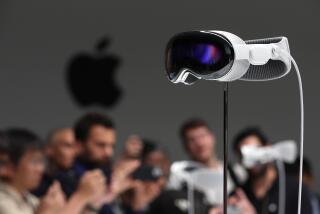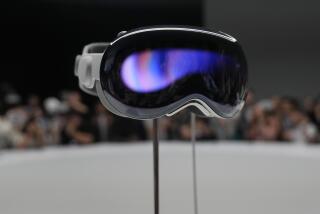Apple’s New Core Product : Technology: The computer maker shows off its long-awaited Newton MessagePad, going on sale next week.
- Share via
CUPERTINO, Calif. — Much in need of a hot new product, Apple Computer Inc. on Thursday unveiled its long-anticipated Newton MessagePad, a lightweight electronic sidekick that the company hopes will nevertheless be powerful enough to help pull it out of a hole.
Demonstrated by employees at an Apple conference room here, Newton didn’t reinvent the laws of physics, but its performance was pretty slick just the same. The size of a paperback and weighing less than a pound, Newton can send faxes or electronic mail while setting up a lunch date and keeping track of phone numbers.
Operated with a stylus resembling a felt-tip pen, Newton can translate most handwriting into computer text, turn some scribbles into a formal typed business letter and convert a crude square drawn with a fingernail into a perfect box. With an optional Newton Messaging Card, it can even receive and store wireless paging messages.
“Apple has taken a lot of raps on Newton, but the bottom line is they’ve pulled off something that’s very innovative,” said William Bluestein, director of computing strategy research at Forrester Research in Cambridge, Mass.
Among the first of a whole crop of “personal digital assistants” likely to start appearing soon, Newton is enormously important for Apple, whose personal computers are caught up in a bloody price war that has sharply cut earnings.
Indeed, the Newton was introduced as Apple is in the throes of a sweeping corporate overhaul marked by management turnover and thousands of layoffs. The hope is that Apple’s hand-held device, by appealing to a much broader market than desktop or laptop computers, will provide a new outlet for the company’s expertise at making smart machines user-friendly.
The market is potentially huge. A recent survey by Link Resources and International Data Corp. predicted that sales of such products could shoot up to $3.5 billion in 1998.
“This is the right moment, the right place,” said Gaston Bastiaens, the thickly accented Belgian who is vice president and general manager of the Apple division overseeing Newton’s development.
His comment seemed to defy skeptics, who have contended that the much-hyped but seemingly never finished product was in peril. As it stands, the Newton still doesn’t have a lot of the amenities that many computer users take for granted, such as a color screen, but Bastiaens said more sophisticated screens and communications technology would be included in later generations of Newton, some of which are expected to be out within a year.
Even so, with a variety of rival products in the pipeline and Apple’s profits continuing to be pummeled by falling computer prices, few would call Newton the company’s savior.
For starters, the device is likely in the short run to account for a tiny fraction--perhaps $60 million, by one analyst’s estimate--of Apple’s annual sales, now at $8 billion.
“I think the cognoscenti will buy it,” said technology analyst Bruce Lupatkin with the Hambrecht & Quist investment firm in San Francisco. “But at a starting price of $700, it’s too expensive for the masses. I’m not expecting everyone to see one in their Christmas stockings.”
Initially, Apple officials said they expect Newton to appeal to gadget-minded individuals fascinated by unproven technologies and to corporations that will buy a few units for a trial run. Much of Apple’s Newton revenue will come from licensing fees and the sale of accessories and information services.
As usual with such products, one key will be how fast software comes on line to enable Newton to perform more tasks. More than 1,300 software developers have signed on, but Bastiaens said that number is expected to grow to several thousand after more developers get a look at the product in Boston next week at the MacWorld Expo. About 50 titles are anticipated by the 1993 holiday season.
Among rivals with similar gadgets in the pipeline are Tandy, Motorola and Sharp.
A much more sophisticated--and expensive--”personal communicator” made by Eo Inc., based in Mountain View, has been on the market since April. Described as a mobile office, Eo’s machine combines a cellular phone, fax and personal organizer with a pen-based computer. It ranges from $2,000 to $3,299. An Eo spokeswoman said “thousands have been sold,” exceeding expectations.
The Newton will go on sale Monday in Boston and New York at an anticipated base price of about $700, and by Labor Day elsewhere in the country, including California.
Personal Digital Assistants
* What they are: Wireless, hand-held devices operated with a penlike object that can serve as a mobile personal secretary. They are also known as personal communicators or personal information managers.
* What they do: Function as electronic calendars, address books and note pads, allow sending (and in some cases receiving) of faxes, provide access to maps, stock prices and other data.
* Who will make them: Apple Computer, Tandy, Eo (51% owned by AT&T;), Firstperson (a unit of Sun Microsystems), Motorola, Sharp, others. * What they cost: In general, $600 to $3,000.







